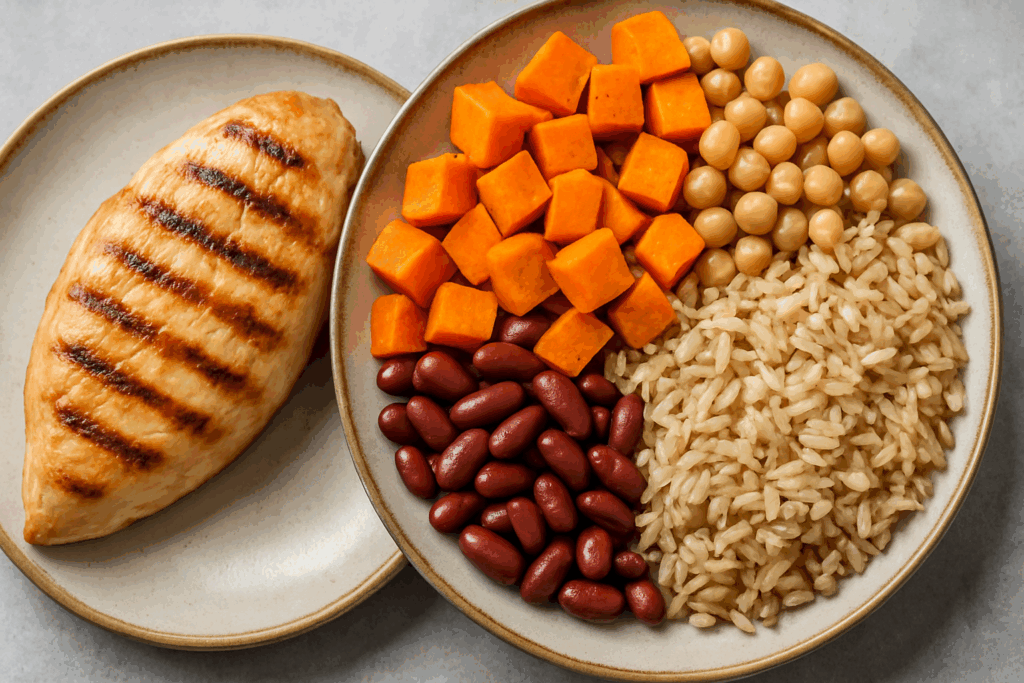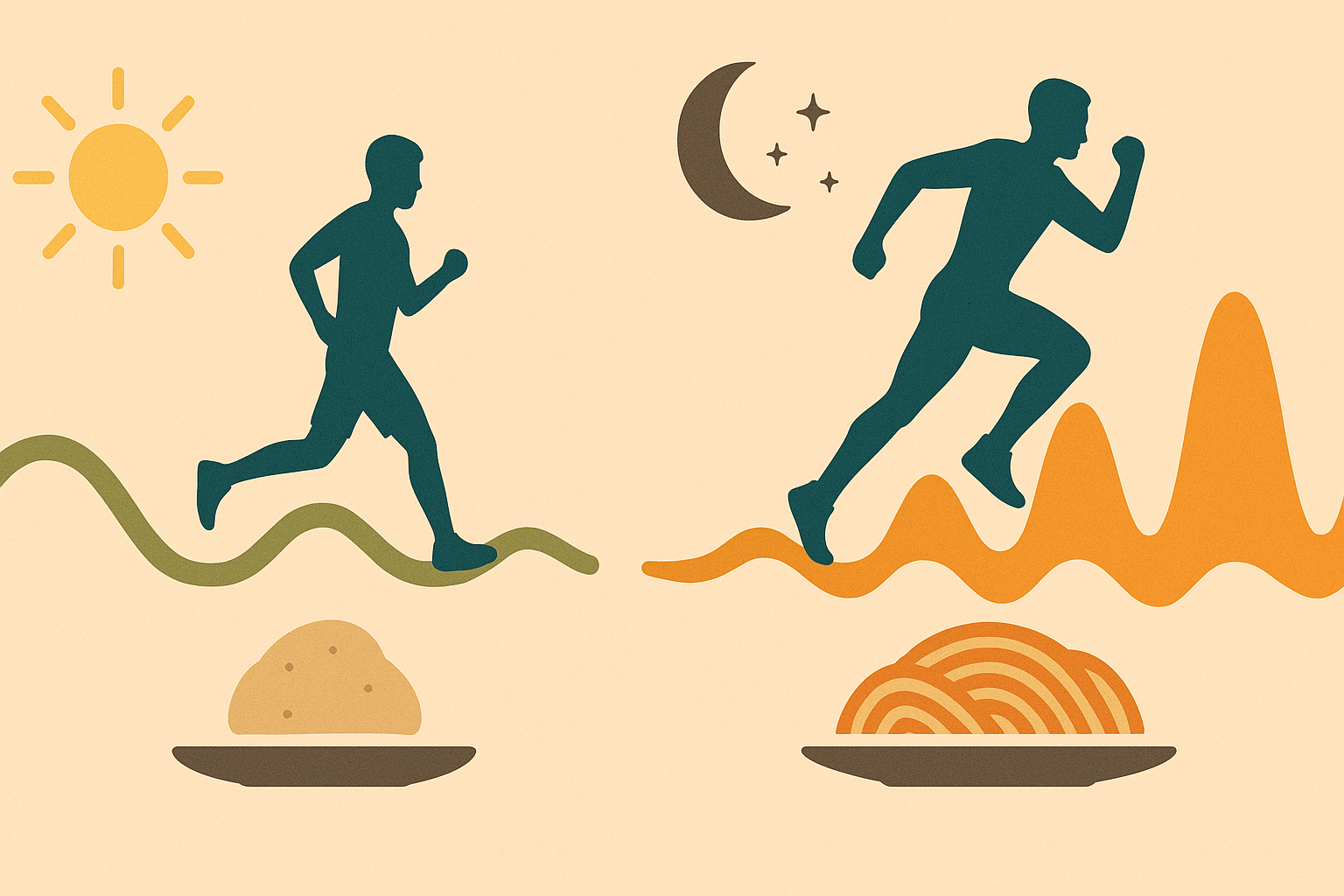In the ever-evolving landscape of nutrition science and performance optimization, high-protein diets have garnered significant attention for their role in muscle development, weight management, and metabolic enhancement. However, amidst the protein-centric spotlight, one crucial macronutrient often gets sidelined—carbohydrates. In truth, the essential role of carbs for muscle growth is inseparable from the success of any high-protein diet aimed at hypertrophy, recovery, and long-term sustainability. Understanding how carbohydrates complement protein metabolism is paramount to achieving peak muscle-building potential without undermining energy availability, hormonal balance, or training output.
You may also like : The Ultimate High-Protein Nutrition Plan: How to Gain Muscle in Women Safely and Effectively

Why Muscle Growth Demands More Than Just Protein
The simplified equation of “eat more protein, grow more muscle” overlooks a host of intricate physiological mechanisms. While protein is undeniably crucial for muscle protein synthesis (MPS), carbohydrates play a supporting yet indispensable role in multiple stages of muscle development. For one, carbs serve as the primary source of glucose—the body’s preferred fuel for high-intensity exercise. When glycogen stores are depleted due to insufficient carbohydrate intake, not only does performance suffer, but so does the body’s ability to initiate and sustain anabolic processes post-exercise.
Moreover, insulin, which is triggered predominantly by carbohydrate ingestion, has a potent anabolic effect on muscle tissue. Insulin facilitates amino acid uptake into muscle cells and reduces protein breakdown, setting the stage for a net positive protein balance. Without adequate carb intake, the muscle-building response to protein consumption can be significantly muted, leading to suboptimal gains despite sufficient protein intake.
Additionally, low-carb diets often elevate cortisol levels—a catabolic hormone that counters the effects of insulin. Elevated cortisol can promote muscle protein breakdown, increase fatigue, and stall progress. Thus, for individuals committed to maximizing muscle growth, carbs are not merely a side note but a key player that must be harmonized with protein intake.

How Carbohydrates Enhance Training Performance
One of the most direct ways in which carbohydrates support muscle growth is through their ability to fuel resistance training sessions. The majority of energy required for weightlifting, sprinting, and other anaerobic activities comes from muscle glycogen, which is replenished through dietary carbohydrate intake. When glycogen levels are topped off, athletes experience better endurance, greater strength output, and improved recovery between sets—factors that contribute to increased training volume and intensity.
Without adequate carbohydrates, the body may turn to alternative energy sources, including amino acids from muscle tissue, which undermines hypertrophy goals. Over time, this can create a paradox where a high-protein diet, in the absence of sufficient carbs, leads to muscle breakdown rather than muscle gain. It becomes clear that carbs for muscle growth are not optional but integral to sustaining the training stimuli necessary for hypertrophic adaptation.
Additionally, carbohydrate availability influences neuromuscular efficiency and mental focus during training. Low-carb states are often associated with brain fog, decreased motivation, and impaired motor coordination. These neurological impacts can compromise workout quality, reduce adherence to training programs, and ultimately limit muscle development. By ensuring ample carbohydrate intake, especially in the peri-workout window, athletes can maintain both physiological and psychological readiness to perform at their best.
The Role of Insulin and Anabolism in Muscle Repair
Insulin’s contribution to muscle growth extends far beyond its role as a blood sugar regulator. In the context of muscle physiology, insulin acts as a powerful anabolic agent that promotes nutrient storage and inhibits muscle protein breakdown. Carbohydrates are the most effective macronutrient for stimulating insulin secretion, thereby amplifying the anabolic potential of a high-protein diet.
When carbohydrates are consumed alongside protein, the resulting insulin response enhances the transport of amino acids into muscle cells. This synergistic effect accelerates muscle repair and recovery, particularly after intense workouts that create microtears in muscle fibers. Furthermore, insulin helps shuttle glucose into cells to replenish glycogen stores, which is crucial for sustaining energy and avoiding overtraining.
Research also suggests that insulin blunts the catabolic effects of cortisol, a stress hormone that rises during prolonged or intense exercise. High cortisol levels can interfere with muscle recovery and increase the risk of overreaching or overtraining syndrome. By including adequate carbs in the diet, especially post-workout, individuals can create a hormonal environment more conducive to muscle growth and repair.
Debunking the Myth: Are Carbs Counterproductive to Fat Loss?
A pervasive myth in fitness circles is that carbohydrates are inherently fattening and should be minimized or eliminated to achieve a lean physique. However, this oversimplification ignores the metabolic nuances of carbohydrate utilization and storage. In reality, the timing, quality, and quantity of carbohydrate intake play a much greater role in body composition than total carb elimination.
When combined with a well-structured high-protein diet and an appropriate training regimen, carbohydrates can actually enhance fat loss by supporting performance and recovery. Better training output leads to more calories burned, greater muscle retention, and a higher resting metabolic rate—all of which contribute to improved body composition. In contrast, extremely low-carb diets can lead to muscle loss, metabolic slowdown, and increased cravings, making long-term adherence difficult.
Moreover, carbohydrates have a protein-sparing effect, meaning they reduce the need for the body to oxidize amino acids for energy. This allows protein to fulfill its primary function of supporting tissue repair and growth, rather than being diverted for fuel. Thus, rather than being a threat to fat loss, carbohydrates—when consumed strategically—can amplify the results of a high-protein, muscle-preserving fat loss plan.

Choosing the Best Carbs for Muscle Growth and Recovery
Not all carbohydrates are created equal, and the best carbs for muscle growth are those that provide sustained energy, replenish glycogen stores efficiently, and support insulin-mediated anabolic responses. Whole food sources such as sweet potatoes, brown rice, quinoa, oats, and legumes are excellent choices due to their nutrient density, fiber content, and slow-digesting properties.
These complex carbohydrates release glucose gradually into the bloodstream, preventing insulin spikes and crashes while maintaining a steady supply of energy during training. They also contain essential micronutrients like magnesium, B vitamins, and potassium, which support muscle function, energy metabolism, and recovery. Including a variety of these foods in your diet not only enhances physical performance but also contributes to overall health and disease prevention.
In the peri-workout window, faster-digesting carbs like white rice, bananas, or rice cakes may be more appropriate to rapidly replenish glycogen and stimulate insulin. These options can be paired with protein-rich foods such as whey shakes, Greek yogurt, or lean meats to maximize nutrient absorption and muscle recovery. Ultimately, the timing and type of carbohydrate should align with individual training goals, energy needs, and digestive preferences.
Balancing Macronutrients for Optimal Muscle Growth
While high-protein intake is often emphasized in muscle-building protocols, macronutrient balance is key to long-term success. An excessive focus on protein at the expense of carbohydrates can impair performance, increase stress hormone production, and limit anabolic signaling. Conversely, a well-balanced approach that incorporates adequate carbs, proteins, and healthy fats creates a synergistic environment for muscle development.
Calculating individual macronutrient needs should take into account factors such as training volume, body composition, metabolic rate, and recovery capacity. Athletes who train intensely or have high energy demands may benefit from a macronutrient distribution of approximately 50% carbohydrates, 25% protein, and 25% fat. Those with lower energy expenditure may opt for a more moderate carb intake while still preserving performance and muscle mass.
Flexibility and adaptability are also important. On high-training days, increasing carbohydrate intake to match energy output can prevent glycogen depletion and overtraining. On rest days, a slight reduction in carbs may be appropriate to maintain energy balance. By aligning macronutrient intake with lifestyle and training demands, individuals can sustain consistent progress without the negative side effects of extreme dietary restrictions.

Understanding Carb Periodization and Strategic Intake
Carbohydrate periodization is a strategic approach to optimizing carbohydrate intake based on training intensity, duration, and recovery needs. This technique allows individuals to fuel workouts effectively, enhance muscle growth, and manage body composition without overconsumption of calories. Carb periodization involves increasing carb intake on training days and tapering it on rest or lower-activity days.
For example, a bodybuilder might consume a higher amount of carbohydrates in the morning and around workouts, when insulin sensitivity is highest and energy demands are greatest. This supports glycogen replenishment, protein synthesis, and recovery. Conversely, during rest days or lighter activity periods, carbohydrate intake can be reduced to prevent excess caloric intake and support fat metabolism.
This method is particularly effective for athletes who need to balance lean muscle gains with low body fat percentages, such as physique competitors or endurance athletes in weight-class sports. By aligning carbohydrate intake with energy needs and hormonal fluctuations, carb periodization provides a more nuanced and effective strategy for optimizing carbs for muscle growth without compromising metabolic health.

Carbohydrates and Hormonal Health in Active Individuals
Beyond fueling performance and recovery, carbohydrates also play a pivotal role in hormonal regulation. Hormones such as testosterone, insulin-like growth factor 1 (IGF-1), and thyroid hormones are influenced by energy availability and macronutrient intake. Chronically low carbohydrate intake can disrupt hormonal balance, impairing muscle development and reducing metabolic rate.
Testosterone, a key driver of muscle protein synthesis, is particularly sensitive to energy deficiency and stress. Low-carb diets have been shown to reduce testosterone levels, especially in men who engage in high-volume training. Similarly, thyroid hormones, which regulate metabolism and energy expenditure, may decline in response to inadequate carbohydrate intake, leading to fatigue, cold intolerance, and weight gain.
Furthermore, leptin, a hormone that signals satiety and regulates energy balance, is directly influenced by carbohydrate intake. In the absence of sufficient carbs, leptin levels drop, increasing appetite and reducing energy expenditure. These hormonal changes can make it difficult to adhere to a diet, recover from training, or maintain lean body mass. Including the best carbs for muscle growth in your meal plan can help maintain hormonal homeostasis, energy availability, and long-term performance.
The Psychological and Behavioral Benefits of Including Carbs
From a behavioral perspective, incorporating carbohydrates into a high-protein diet can improve adherence, satisfaction, and overall well-being. Diets that are overly restrictive in carbs often lead to feelings of deprivation, low mood, and binge eating episodes. These psychological stressors can sabotage long-term progress and diminish the sustainability of any diet plan.
Carbohydrates influence the production of serotonin, a neurotransmitter that regulates mood, appetite, and sleep. Adequate carbohydrate intake supports mental health by promoting emotional stability, reducing anxiety, and improving cognitive function. For active individuals, the psychological benefits of carbs are especially important, as training itself imposes significant mental and physical stress.
By adopting a balanced, inclusive approach that honors the essential role of carbs for muscle growth, individuals can build a diet that is not only effective but also enjoyable and easy to maintain. The synergy between nutritional adequacy and psychological satisfaction is often the missing link in successful body transformation programs.
Gut Microbiota, Carbs, and Anabolic Potential
The gut microbiome is a frontier of emerging importance in sports nutrition. Recent research suggests that dietary carbohydrates, particularly fermentable fibers and resistant starches, influence the composition and functionality of gut bacteria, which in turn modulate systemic inflammation, nutrient absorption, and even hormonal regulation.
Carbohydrate-rich whole foods like legumes, oats, and bananas promote the growth of short-chain fatty acid (SCFA)-producing bacteria. SCFAs such as butyrate have been shown to enhance muscle function, reduce catabolism, and increase nutrient partitioning. Additionally, a healthy microbiome improves digestion and assimilation of amino acids, further amplifying the effectiveness of a high-protein diet.
In this sense, the best carbs for muscle growth do more than replenish glycogen; they actively cultivate a gut environment that optimizes muscle anabolism and metabolic efficiency.
Carb Timing in Older Adults: Preserving Muscle with Age
As individuals age, muscle protein synthesis becomes less responsive to dietary stimuli—a phenomenon known as anabolic resistance. Older adults often struggle to maintain lean mass due to hormonal changes, reduced physical activity, and decreased appetite. While protein needs increase with age, the strategic use of carbohydrates can help mitigate anabolic resistance.
Carbohydrates support muscle maintenance in older adults by enhancing insulin sensitivity, improving training output, and reducing muscle breakdown. Timing carb intake around exercise can amplify the anabolic response to protein and help preserve muscle mass. This becomes particularly critical during periods of illness, injury, or caloric restriction.
For aging populations, a diet that combines high-quality protein with strategically timed carbohydrates can combat sarcopenia more effectively than protein alone. Recognizing the importance of carbs for muscle growth in older individuals is essential for developing age-specific nutrition protocols.
Gender Differences in Carb Utilization and Muscle Building
Men and women differ in substrate metabolism during exercise. Research indicates that women tend to rely more on fat oxidation and conserve glycogen better than men. This could lead to underestimating carbohydrate needs in female athletes and fitness enthusiasts. However, despite metabolic differences, women still benefit from carbohydrates for muscle recovery, hormone balance, and strength development.
In women, carbohydrate intake is particularly important in preserving menstrual health and supporting adequate leptin levels, which influence ovulation and metabolic rate. Low-carb, high-protein diets have been associated with menstrual irregularities, decreased bone mineral density, and reduced athletic performance.
Ensuring adequate carbohydrate intake in active women not only supports muscle building but also protects long-term health. Addressing these gender-specific nuances adds valuable depth to the conversation around carbs for muscle growth.
Intermittent Fasting, Carb Refeeds, and Anabolic Compensation
Intermittent fasting (IF) protocols are increasingly popular among fitness enthusiasts, but they often come with reduced carbohydrate intake, especially when meals are compressed into a narrow eating window. While IF can be effective for fat loss, it may impair muscle growth if carbohydrate intake is insufficient to meet energy demands.
One strategy to mitigate this is the use of strategic carb refeeds—periods of higher carbohydrate intake interspersed with IF routines. These refeeds replenish glycogen, boost leptin levels, and increase the thermic effect of food, creating a more favorable anabolic environment. They can also restore hormonal function and improve training performance after several days of low-carb intake.
For those practicing IF, integrating high-carb meals post-workout or during refeed days ensures the preservation of lean mass while benefiting from the metabolic perks of fasting. This approach reinforces the adaptability and necessity of carbs for muscle growth even in unconventional dietary frameworks.

Creatine Transport and Carbohydrate Synergy
Creatine monohydrate is one of the most well-researched and effective supplements for increasing muscle strength and size. What is less commonly known is that insulin facilitates creatine uptake into muscle cells. Co-ingestion of carbohydrates with creatine enhances creatine retention, thereby improving its ergogenic effects.
Studies have shown that consuming creatine with a high-glycemic carbohydrate source significantly increases muscle creatine content compared to creatine alone. This underscores the synergistic effect of carbohydrates not only on protein but also on other performance-enhancing nutrients. Athletes seeking to maximize their creatine supplementation should consider pairing it with carbohydrates for optimal results.
By recognizing this interaction, we expand the scope of carbs for muscle growth beyond glycogen and into the domain of enhanced supplement efficacy.
Practical Tips for Integrating Carbs into a High-Protein Diet
To maximize the benefits of carbohydrate inclusion without compromising the goals of a high-protein diet, it’s important to focus on quality, timing, and personalization. Start by identifying your total energy needs and distributing your macronutrients in a way that supports your training demands and recovery cycles. Include a mix of complex and simple carbs throughout the day, prioritizing complex carbs for baseline energy and simple carbs around workouts.
Incorporate whole grains, starchy vegetables, legumes, and fruits into your daily meals, and pair them with high-quality protein sources to create balanced, nutrient-dense plates. Use tools like food tracking apps or consultations with sports dietitians to fine-tune your intake and monitor your progress. Don’t fear carbs—embrace them as essential tools in your muscle-building arsenal.
When planning meals, consider using a three-meal, two-snack structure to maintain energy and nutrient availability throughout the day. Include carbs in every meal to stabilize blood sugar, support performance, and prevent catabolism. Adjust portion sizes based on your activity levels, and remain flexible as your training or goals evolve.
FAQ: Advanced Insights on Carbs for Muscle Growth
1. How do different training styles affect carbohydrate needs for muscle development?
Carbohydrate requirements vary significantly depending on the type and intensity of training. High-repetition bodybuilding sessions, explosive Olympic lifting, and sprint-style training each place unique demands on glycogen reserves. For example, hypertrophy-focused training with short rest intervals requires a greater carbohydrate influx compared to low-volume strength work because it taps more aggressively into anaerobic energy systems. Carbohydrates help maintain pace, volume, and technique across sessions, particularly during training cycles that emphasize progressive overload. When training shifts toward power or maximum strength with longer rest periods, carbohydrate needs may drop slightly but remain important for recovery and performance consistency.
2. What are the psychological benefits of including carbs in a muscle-building diet?
Beyond physical performance, carbohydrates influence psychological well-being and training adherence. Carbohydrates support serotonin production, which directly affects mood, motivation, and sleep quality—all of which are critical for consistent training. Diets low in carbs can contribute to irritability, mental fatigue, and even depressive symptoms, especially during prolonged cutting phases. For athletes undergoing intense training, maintaining mental resilience is as crucial as physical recovery, and carbs play a subtle but powerful role in this balance. Including the best carbs for muscle growth not only supports muscular development but can also enhance an athlete’s mental fortitude over the long term.
3. Can carbs for muscle growth be beneficial during cutting phases or calorie deficits?
Contrary to common belief, carbohydrates can—and often should—remain a part of a muscle-preserving strategy during a fat-loss phase. While total caloric intake must drop to promote fat loss, retaining a moderate amount of carbohydrates helps prevent muscle catabolism by maintaining training intensity and recovery. Strategic carb cycling, where intake is higher on training days and lower on rest days, can optimize fat-burning while preserving lean mass. By timing carbs around workouts, insulin sensitivity is harnessed for muscle preservation without significantly impairing fat loss. Thus, using carbs for muscle growth during a deficit supports performance and metabolic health without compromising aesthetic goals.
4. What is the connection between sleep quality and carbohydrate intake in athletes?
Emerging research shows that carbohydrates can positively impact sleep onset and quality, especially when consumed in the evening. Carbohydrate-rich meals help increase the availability of tryptophan, an amino acid that crosses the blood-brain barrier to produce serotonin and melatonin—two neurotransmitters involved in regulating sleep. Athletes who prioritize recovery know that high-quality sleep is essential for growth hormone release and muscle repair. Poor sleep impairs protein synthesis, increases cortisol, and reduces testosterone levels—all of which are detrimental to muscle development. Including the best carbs for muscle growth at dinner may indirectly boost recovery by improving sleep architecture.
5. How can endurance athletes use carbs for muscle growth without compromising performance?
Endurance athletes often fear weight gain from carbs, yet these nutrients are central not only to endurance capacity but also to maintaining lean mass during high training volumes. Including strategic resistance training and high-protein meals alongside carbohydrates can promote muscle growth without excess fat accumulation. During high-mileage training phases, the best carbs for muscle growth should be nutrient-dense and slow-digesting to prevent energy crashes. Post-run or post-ride meals can integrate both fast-digesting carbs and protein to accelerate recovery and prevent lean mass loss. Endurance athletes benefit from carb-driven muscle maintenance, especially during taper periods or off-seasons focused on building strength.
6. Are there emerging technologies or innovations enhancing how we use carbs for muscle growth?
Yes, the rise of continuous glucose monitors (CGMs) in athletic populations has revolutionized personalized carbohydrate management. By providing real-time data on blood sugar responses, CGMs allow athletes to tailor carbohydrate intake around training intensity and timing. This tech-driven approach helps identify which carbohydrate sources produce stable energy and which may cause performance-disrupting spikes or crashes. Additionally, AI-driven meal planning platforms now integrate metabolic profiles to recommend optimal carb timing and pairing for muscle development. As personalization in sports nutrition evolves, these innovations help fine-tune how athletes leverage carbs for muscle growth with precision.
7. How do the best carbs for muscle growth differ between morning and evening workouts?
Timing matters, and so does carb selection based on the time of training. For morning workouts, fast-digesting carbs like fruit, rice cakes, or a slice of white toast provide quick energy without heaviness. These can be paired with protein for pre-workout meals or post-training recovery. Evening workouts benefit from more sustained carbohydrate sources earlier in the day (like oats or sweet potatoes) to stabilize energy. Post-workout evening meals can include starchy carbs such as jasmine rice or pasta to promote recovery and support better sleep. Choosing the best carbs for muscle growth involves understanding how your body processes carbs throughout the day, aligning with training and rest rhythms.
8. What role do carbs play in hormone regulation specific to muscle growth?
Carbohydrates influence several hormones integral to muscle development, including insulin, cortisol, testosterone, and thyroid hormones. Insulin is not just a glucose regulator; it is anabolic and enhances amino acid uptake. Consistent carb restriction raises cortisol, which can suppress testosterone and blunt hypertrophic adaptations. Adequate carb intake also supports active thyroid hormone levels, which drive metabolic rate and muscle protein turnover. Including carbs for muscle growth creates a hormonal environment where muscle-building processes are supported, recovery is enhanced, and metabolic efficiency is preserved. Ignoring this balance may impair progress, particularly for advanced athletes seeking marginal gains.
9. What are practical ways to use carbs for muscle growth on a plant-based diet?
Plant-based athletes can leverage a variety of whole-food carbohydrates that also provide complementary proteins and essential micronutrients. Lentils, black beans, chickpeas, oats, and quinoa are among the best carbs for muscle growth in vegan diets due to their dual contribution of complex carbs and amino acids. Strategic food pairing—such as combining rice with beans or hummus with whole-grain pita—can enhance protein quality while optimizing glycogen replenishment. Post-workout shakes made from fruit, almond milk, and plant-based protein powders offer a convenient way to blend carbs with recovery nutrition. With attention to variety and nutrient timing, plant-based athletes can thrive using carbs as a core component of their muscle-building strategy.
10. How do environmental and cultural factors affect the perception and use of carbs for muscle growth?
Cultural eating patterns and regional dietary norms often shape how people view carbohydrates in the context of fitness. In Western fitness culture, low-carb trends have historically vilified carbs, while in Eastern cultures, rice and grains are staples even among high-performing athletes. Access to different carb sources also influences choices; for example, athletes in tropical climates may rely more on fruits and root vegetables like cassava or plantains. Environmental sustainability is increasingly a factor too, with whole-grain and plant-based carbs often having a lower ecological footprint than animal products. Recognizing that carbs for muscle growth must be tailored to individual, cultural, and environmental contexts promotes inclusivity and better long-term outcomes across diverse athletic populations.
Conclusion: Reclaiming the Power of Carbs in Muscle-Building Nutrition
In the pursuit of peak performance and physique development, it’s time to reclaim the truth about carbohydrates. Far from being detrimental to progress, carbohydrates are a foundational pillar of muscle growth, hormonal balance, recovery, and long-term success. By understanding and honoring the essential role of carbs for muscle growth, individuals can unlock the full potential of high-protein diets without sacrificing energy, motivation, or sustainability.
From enhancing training output and anabolic signaling to preserving lean mass and improving psychological well-being, carbohydrates offer a comprehensive suite of benefits that cannot be overlooked. The key lies not in vilifying or eliminating this vital macronutrient, but in strategically incorporating the best carbs for muscle growth in alignment with personal goals and physiological demands.
By moving beyond outdated dietary dogmas and embracing a balanced, science-backed approach, we empower ourselves to achieve lasting results that support not just muscle gain, but overall health and well-being. Carbohydrates are not the enemy of muscle growth—they are, in fact, its indispensable ally.





